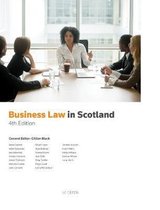Lecture 5 – Directors and Directors’ Duties
Podcast 1
Reading
Grier N, Company Law (5th edn, W Green 2020), Chapters 8 and 9
Black G (ed.) Business Law in Scotland (4th edn, W Green, 2019), Chapters 16.23-16.51
Optional reading:
Boyle and Bird’s Company Law, 10th ed, (2019) Chapter 15
Learning Focus
Podcast 1
▪ The appointment of directors
▪ Different types of directors
▪ Persons who cannot be directors
▪ Removal from office
▪ The proceedings of directors: directors’ meetings
Who is a Director?
So at the core of company law is the fact that the company exists, as we know, as a separate equal
person in its own right. Even though we have a separate entity, artificial and distinct from those who
own and operate it, it means that there has to be other persons with the will and the capacity on their
own to be appointed to allow the company itself to make decisions. The members of the company,
the shareholders are not those people, not the officers of the company, have a shareholding or a
financial interest in the company, of course, but they're not officers of the company.
• An officer who takes decisions on behalf of a company and direct its day-to-day activities:
• Ferguson v Wilson (1866) LR 2 Ch App 77
• “Directors are agents of the company, and their personal liability in a suit, upon a
contract made by them, must be governed by the ordinary law of principal and agent,”
per Cairns LJ
So we need directors to take those management decisions and ensure that the company can operate.
,Appointment of Directors
▪ A directorship is an office: s.250 CA 2006 as any ‘person occupying the position of director, by
whatever name called’. This definition is more useful than it might seem at first sight. A
‘director’, then, is any person (‘natural’ or ‘artificial’) who is either:
• “Authorised to act as such under a particular company’s constitution and appointed to the
role by one of the methods outlined under said constitution – though a person might also be
appointed to the role of director by some other appropriate legal method
-OR-
• Deemed by law to be a director either because that person was held out, by a particular
company, to be such or because that person has acted as a ‘shadow director’ (that is, they
have acted, in fact, to direct the activity of a particular company according to their own will
without having been formally appointed to the role of director).”
• In essence, a director then is a person who officially or unofficially has a control of a company
and is seen in laws holding out as such and acts to manage or direct the company. So what
can be safely presumed that for those who are outside the company, you and I, for example,
that a director has the authority to act on the company's behalf. So again, we're back to agency
again. Express implied an ostensible authority here and to bind the company in legal
obligations, even if the company's internal constitution prescribes the directors actions as
ultra vires.
Different Categories of Officers of a Company
They don't always have to be present in this way, but it shows you the range of officers which can be
involved in the management of a company. What I'm trying to suggest here is that directors might be
given a distinct title to highlight the particular role that they play within the company. That designation
might be other than that they would prefer. But in any case, whether one is described as a managing
director or an executive director or non-existent as a matter of law, anyone who is recognised as
director is liable in accordance with rules regarding directors liabilities to the company. So these terms
are useful from the company's perspective to organise the company. In law, they don't really make a
difference. For example, see Freeman.
• Chairperson
• Managing director / Chief Executive Officer (CEO)
Freeman Lockeyer v Buckhurst Park Properties Ltd [1964] 2 QB 480
So, for example, with managing directors, which are the case of Freeman and Locke, here is
authority for the point. If a person holds out thinking back to Section 250 a person to be its
managing director, even if that person wasn't appointed as such, then that person will be
deemed to be its managing director. So this is an example of holding out to be a managing
director, and the world would then perceive that person to have that authority and would
therefore be deemed to be a managing director.
• Executive and non-executive director
, • contract of employment? S.188 – service contracts 2 years only unless voted on by the
company
• De facto directors
S.250(1): They are treated as directors even if they've not been formally appointed.
Re Mumtaz Properties Ltd [2011] EWCA Civ 610;
If they haven't been appointed, that means that the documents may not have been forwarded
to the registrar of companies to enter them onto the register. So even if their name is not on
the company documentation, the law still treats them as directors.
Holland v Commissioners HMRC [2010] UKSC 51; [2010] 1 WLR 2793
In considering whether a director of a corporate M should be considered de facto of the
company, the guiding principle, the Supreme Court said, was that as long as the director had
performed relevant acts within the remit of his duties as director of the company, then those
acts would be attributed to the company. So any further extension, the court said, on the
concept of de facto directors, would be a matter for legislation, a matter for parliament to
then determine.
So, that confirms the role of a de facto director is the equivalent to a director.
• Shadow directors
s.250(2): It is one who acts in accordance with the directions or instructions that the directors
of the company are accustomed to or perhaps doesn't want to be seen to the outside world
as a director.
Vivendi v Richards [2013] BCC 771
There was an allegation that a director had breached its fiduciary duty. In particular, the
question was whether a consultant was deemed to be a shadow director and liable for breach
of fiduciary duty as a director. Basically, the consultant was involved in assisting the sole
director of the company. So there was an official sole director of the company was the
consultant equivalent of a shadow director and therefore also liable. It was the liquidator that
brought the claim against the sole director and the consultant, and it was a successful claim.
The court said that the sole director was accustomed to act in accordance with the directions
or instructions from the consultant. So therefore, the consultant was a shadow director. There
were a number of reasons why that was the case:
Firstly, the shadow director would have assumed to act in relation to the company's affairs
and to ask the actual sole director to exercise their powers for the company's benefit. So it's
the actions assumed of the shadow director for the first point.
The second point the court made was that a person who gave directions or instructions to a
company’s actual director in the belief that they would be acted upon, then they could be
assumed to be a shadow director and would be assuming to be responsible for the company’s
affairs.
The third point was that even though the court said parliament hadn't designated specifically
for shadow directors, it provides to the consequences of their status. So the consequences





